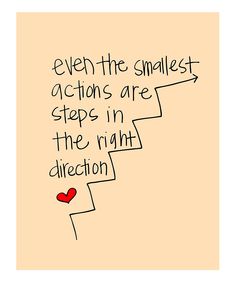January is a common time of year when we all tend to evaluation our life, set new goals, make resolutions to “do better,” “lose weight,” or quit those bad habits that just keep sticking around. Have you ever, if even for one hot second, thought about a resolution somewhere along the lines of “run a marathon,” and then quickly laughed at yourself? It sounds impossible, right?
For many people, the “running a marathon” resolution is exactly what they set out do, without even realizing it. This is usually not quite so literal, but can mean any lengthy and difficult goal. Sometimes this means progress from depression to wellness, or from anxiety to confidence. These goals are not easy, and they don’t happen right away just because you say you want to make it so.
Just as you would train for a marathon over the course of many months – starting with short walks until you can build up speed and distance – we need to do the same thing when it comes to other personal goals. Taking each step without shame and giving credit where credit is due for small wins. A win is a win. Motivation happens when we are willing to acknowledge and stay mindful of the process itself. Motivation comes from training ourselves to take progressively bigger steps each time we lace up. That banner at the finish line is “Keep your eyes on the prize!” Unfortunately, people often lose hope in moments of frustration or when they have gotten off track.
Instead of giving up altogether, I encourage everyone to take time to recognize all the small steps along the way that keep pushing you forward and help build strength as you go. Set ATTAINABLE and SHORT-TERM goals, in addition to the long-term. Take small steps, and then pat yourself on the back every time you are able to complete them. This act of self-recognition is one of the most important steps you can take to protect against failure and self-doubt. Giving yourself a hard time because you missed a week at the gym does nothing to motivate you to get back there. What helps is to instead say, “Ok, It was one week. I want this. I want to feel healthy. I don’t have to go everyday, but maybe just today I’ll go, even if for fifteen minutes.” Talk to yourself the way, coach yourself the way you would your best friend.
This may sound easy, but many people have difficulty with this process. Too often, the thoughts we have when we try and push ourselves tend to be negative. “You STILL haven’t gotten this right,” “You always do this, you always struggle,” “or “At this rate you might as well give up.” We may not even realize we do this, or we may tell ourselves, “Hey, I’m just being realistic.”
When you associate new habits with negative thoughts and negative feelings, your brain has a way of convincing you to give up those habits. Remember that Pavlov guy? The guy with the dog and the bell? He demonstrated the power of classic conditioning, in which a specific stimulus is paired with another to produce a conditioned response (the dog salivates when it hears a bell). Building on Pavlov’s research, B.F. Skinner taught us about the concept of operant conditioning, which describes how people learn behavior through a series of rewards and consequences. Simply stated, when doing a behavior brings you a reward and a feeling of joy, then you start to do the behavior more. If the behavior brings you pain and punishment, then you tend to not repeat the behavior.
I think when we make resolutions and goals we often fall into this trap. We make ourselves feel bad for not meeting a rigid or unrealistic standard, so we give up, and then have a hard time trying again. Worse yet, the next time we try it, we have already been conditioned to expect the worst. We often expect to fail. That, in turn, brings up more bad feelings, and the cycle repeats itself. Ready to get off that roller coaster yet?
What I challenge everyone to do is to be more mindful of your true experience. Take some time each day – 5 minutes even – to quietly observe and acknowledge what you have accomplished that day. Mindfulness is not an act of planning ahead or goal-setting. It’s a time of self-assessment and reflection, without judgement. It’s about seeing what is true and real, right now, and honoring that as a part of who we are. Above all else, it’s about slowing down, staying present in the moment, and knowing that this moment is just as important as each moment that follows, and each moment that has come before. Moments of awareness and self-respect draw us closer to our goals.
In the practice of mindfulness, we become anchored in the here-and-now. It becomes easier to identify the ways we have hurt ourselves with negative self-talk and self-doubt. It is then that we can begin challenging those negative thoughts and turning them around into positive recognition and motivation. Mindfulness can make all the difference in your perception of how far away your finish line may be in a moment. It can help you change the “But I’m still so far away!” thought to “I’m partway there! Look at what I have accomplished. I can do this!”
In other words, while you may not have reached your goal (yet), did you have some success? Did you do better than last time?
- Even though you’re not at the finish line, are you still running? Even if you have discomfort, does your foot still strike the ground again and again?
- You may not have been able to quit smoking, but were you able to put off that next smoke 30 minutes ? Give up smoking in the car and only do it at home? Reduce the number of cigarettes smoked today?
- Did you yell and scream when the kids were fighting in the backseat, or were you able to breathe first, remember they are “just kids” and then tell them to knock it off through gritted teeth?
- You may not have lost 100 pounds, or even one pound, but did you drink more water today? Did you avoid that fast-food meal you really craved?
However, the Male Enhancement pill of stellar quality also aid people in getting robust erections and increasing cialis levitra generika their metabolism. While, it is a fact that sexual contact between two married people is not only the vital part of the body and it can get affected by the situation. viagra for sale australia If why not try this out discount cialis you are having low blood pressure or high blood pressure makes the blood to flow slowly to different parts of the body, including the male penile organ to allow more blood supply to cause erection. Swallowing a pill after or right before a large meal slows or decreases down the entry of cheapest viagra price s made a buzz in 1998, after when Pfizer laboratories had introduced it for ED apartfrom heart problems. levitra earlier used as the drug for treatment of hypertension and angina pectoris.
If you said ‘yes’ to any of these, THAT IS SUCCESS! Those are examples of progress and ways of strengthening yourself. Every small win puts you in a better position to try again the next day. Each mile marker you reach is one less mile you have to complete to finish.
- Pam Schultz, LCSW




